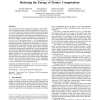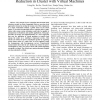204 search results - page 9 / 41 » New 802.11h mechanisms can reduce power consumption |
ASPLOS
2010
ACM
14 years 2 months ago
2010
ACM
Growing transistor counts, limited power budgets, and the breakdown of voltage scaling are currently conspiring to create a utilization wall that limits the fraction of a chip tha...
HOTOS
1999
IEEE
13 years 12 months ago
1999
IEEE
Reducing the energy consumed in the use of computing devices is becoming a major design challenge. While the problem obviously must be addressed with improved low-level technology...
DAC
2007
ACM
14 years 8 months ago
2007
ACM
Minimizing power consumption is vitally important in embedded system design; power consumption determines battery lifespan. Ultralow-power designs may even permit embedded systems...
ICS
2000
Tsinghua U.
13 years 11 months ago
2000
Tsinghua U.
One of the main concerns in today's processor design is the issue logic. Instruction-level parallelism is usually favored by an out-of-order issue mechanism where instruction...
CLUSTER
2008
IEEE
14 years 2 months ago
2008
IEEE
—The concept of green computing has attracted much attention recently in cluster computing. However, previous local approaches focused on saving the energy cost of the components...


